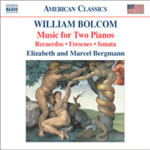
Music for Two Pianos
 $25.00
Out of Stock
$25.00
Out of Stock6+ weeks add to cart
BOLCOM
Music for Two Pianos
Elizabeth Bergmann (piano) / Marcel Bergmann (piano)
[ Naxos American Classics / CD ]
Release Date: Friday 20 January 2006
This item is currently out of stock. It may take 6 or more weeks to obtain from when you place your order as this is a specialist product.
BARGAIN OF THE MONTH
"Naxos seems to conjure this sort of thing from their sleeve like a magician's never-ending handkerchief – long may it remain so"
(MusicWeb Dec 2005)
BARGAIN OF THE MONTH (MusicWeb Dec 2005)
"Naxos seems to conjure this sort of thing from their sleeve like a magician's never-ending handkerchief – long may it remain so"
(MusicWeb Dec 2005)
William Bolcom was born in Seattle, Washington. He studied composition with Milhaud at Mills College in Oakland, California from 1958 to 1961, continuing with him and Messiaen in Paris. While teaching at Queens College in New York City in the late 1960s, he developed an interest in ragtime piano performance that helped spur a renewed interest in the music, leading to the composition of rags such as Graceful Ghost. Since 1973 he has taught at the University of Michigan. Bolcom is best known for his many recitals and recordings of historical American popular song with his wife, mezzo-soprano Joan Morris. His early compositions are serial, reflecting Boulez, Stockhausen and Berio. With his discovery of ragtime, he found his mature style that melds popular and classical idioms in a distinctively American eclecticism.
Perusing a collection of late nineteenth-century Latin American dances inspired Recuerdos (Reminiscences). Bolcom saw the continuity between American ragtime and the larger world tradition of light piano music, writing his own tribute and evocations of that era. Chôro, the genre of Brazilian street folk-song, is in the style of Ernesto Nazareth, its creator. Paseo reflects the melding of Latin and North American musics in Civil War-era New Orleans in the music of America's first classical virtuoso pianist Louis Moreau Gottschalk. Valse Venezolano is a Venezuelan waltz in the style of Ramón Delgado Palacios. It makes use of many of the stylistic elements of Palacios, including unexpected leaps, modulations and phrase lengths as well as excursions into 5/8 metre. Recuerdos was written for and first given at the Murray Dranoff Two- Piano Competition in 1991.
Frescoes is one of Bolcom's most powerful works in its scope and colours. In the detailed preface, Bolcom, inspired by the brief sketching, rapid painting and grand vision of fresco technique, wrote Frescoes in similar style. The pianists also double on harpsichord and harmonium. The score itself, typical of many works of the late 1960s and early 1970s, is visual "eye music” incorporating aleatoric improvisation, unsynchronized playing, tone clusters and plucking of the strings. The work is in two movements, War in Heaven and The Caves of Orcus. It was first performed in 1971 in Toronto by Bruce Mather and Pierriette LePage.
The Sonata for Two Pianos in One Movement displays the focus resulting from the condensation of a three-movement form into a single movement. The first movement Gaia, the earth mother creatrix and sustainer of life on Earth, explores a nearly orchestral range of colours through a sonata-form structure of themes in which a lyrical third theme, in Bolcom's words, "set(s) up a conflict that proves to be irresoluble except by continuing into the other two movements”. Night Diversion uses two pedal tones from Gaia which leads to a third (B flat); this note brackets two quotations, the first from Schoenberg's Harmonielehre and the second the first ten notes from Debussy's Brouillards. Ancient Dances grew from an early Bolcom fragment. The conflicts of the previous two movements return to be resolved in a clear D major with the lyrical third theme of the first movement in apotheosis to end the work. Bolcom combines ancient Greek rhythms with a dancing blues, creating unforeseen connections. The Sonata was commissioned for the Paratore brothers' piano duo who gave the première in 1994.
Interlude dates from the early 1960s and the composer's "total chromatic period”, which took place in Paris and at Stanford and includes the first dozen piano études and works such as Décalage for cello and piano.
Bolcom's suite The Garden of Eden, originally for solo piano, uses the ragtime idiom to tell the biblical story of the Fall from Genesis. It consists of four movements, each a self-contained "rag”. Bolcom arranged the third and fourth rags, The Serpent's Kiss and Through Eden's Gates, for two pianos in 1994 for their première recording by Richard and John Contigula. The Serpent's Kiss uses various ragtime effects such as heel stomping and knocking on the wood of the piano in addition to aptly appropriate tongue clicking. Through Eden's Gates, in Bolcom's words, "conjures the image of Adam and Eve calmly cakewalking their way out of Paradise”.
Tracks:
Recuerdos
Frescoes (arr. for 2 pianos)
Sonata for Two Pianos in One Movement
Interlude
The Garden of Eden (excerpts)